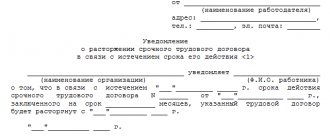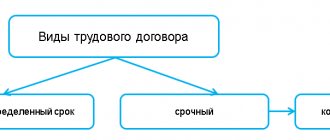Reasons for change
In total, in accordance with the Labor legislation of the Russian Federation, there are two types of reasons why legal changes can be made in the employment contract between the employer and his subordinate. The first ones are technological, i.e. when an enterprise introduces various innovations in the production process (for example, new equipment is purchased, modernization is underway, a change in activity direction occurs, etc.). But such reasons are not as common as the second type - organizational.
- Form and sample
- Free download
- Online viewing
- Expert tested
FILES
Organizational reasons include a change in the name of a legal entity or its reorganization (merger or, on the contrary, fragmentation of structural divisions), “moving” of the company to another locality, and a change in the operating mode of the enterprise.
In all other cases, for example, when editing the company’s regulatory documentation (internal labor regulations, including staffing), changes made to the employment contract may be considered illegal (especially if they lead to a deterioration in the work of employees - namely In such situations, legal action most often occurs).
Job offer
If an employee refuses to work in other conditions, the employer must offer in writing the vacant positions available in the area in accordance with qualifications. In the absence of such, the employer offers another lower-level position or work that is paid lower, and the employee is able to perform it, taking into account his state of health.
Complying with the requirements of Art. 74 of the Labor Code of the Russian Federation, the employee should be offered a list of vacancies with a name, description of responsibilities, working conditions (salary, regime). Vacancies must be offered throughout the notice period. When offering such positions, the manager does not have the right to check the business and other qualities of the employee, since the work must initially correspond to the person’s qualifications. The employer is obliged to offer positions from another locality when this is provided for in the collective agreement or labor agreement.
What changes may be
Most often, in contracts between the parties to labor relations, clauses regarding wages change, including salary, allowances, bonuses, compensation, as well as what relates to working time (for example, changes occur in the work schedule, part-time work is introduced, etc. .p.), it is also possible to change the name of the employee’s position.
However, with all this, it is completely unacceptable for the list of the employee’s main responsibilities to change (in this case, if there is a real need, the most optimal way is to transfer him to another position within the company).
The employee refused changes to the contract, but agreed with the transfer
If you refuse to work under the new conditions and have consent to the transfer, the parties draw up an additional agreement providing for transfer to another position (from the list proposed by the employer).
The employer creates an administrative document on the transfer in accordance with Art. 72.1 of the Labor Code of the Russian Federation and enters information into the personal card T-2 (Resolution of the State Statistics Committee No. 1 of 01/05/2004).
Notification procedure
The first step to change the terms of the employment contract can be taken by both the employee and his employer. Moreover, if in the first case everything is more or less clear, management can either accept or reject the employee’s proposal, then in the second case everything is somewhat more complicated.
If management has decided to make some changes in the work of employees, it has the right to make them unilaterally.
But at the same time, it is obliged to notify subordinates about them in writing within the period established by law. The notification must indicate the reason why the changes are necessary, as well as a link to the article of the law that is directly related to them.
And only after this, information about all changes is included in the current employment contract by drawing up an additional agreement with the employee. From the day it is signed by the parties, the employee begins to perform his functions under new conditions.
Additional agreement or dismissal order
If the employee does not agree to work under the new conditions, the employer must issue an order using the unified T-8 form. The basis for the document will be the employee’s refusal to continue working in the new conditions.
The administrative document is drawn up with reference to clause 7, part 1, art. 77 of the Labor Code of the Russian Federation, indicating the full name, last day of work and signed by the manager. The employee is familiarized with the order to terminate the employment agreement against his signature. If it is not possible to bring the contents of the paper to the attention of the employee or he refuses to sign the order, an appropriate entry must be made in it.
When should employees be notified?
Notification of changes planned to be made to the employment contract must be made at least two months before the event itself.
During this time, the employee can decide whether to agree with them or refuse and try to find a new job. Moreover, if the employee agrees to the changes proposed to him, they can be included in the employment contract before the two-month period expires.
It should be noted that one of the key points when an employer changes the terms of an employment contract is his obligation to inform his subordinate about available vacancies within the company. This is necessary so that the employee has the opportunity to stay in the company if suddenly he is not satisfied with the innovations that management is introducing in relation to his current position. At the same time, the vacancies offered by the employer must correspond to the education, work experience, and qualifications of the employee. However, the law gives the latter the right to refuse them if he considers it most appropriate.
What is the procedure for informing
The employer notifies of the salary reduction no later than two months before the changes. The manager is required to justify significant changes to the employment contract. The means of information is notification to the employee.
There is no unified form - it is enough to prepare a message in any form justifying the reasons for the salary reduction and hand it over to the employee. Here's how to create such a notice:
- Use the organization's letterhead.
- Indicate the addressee - the employee's full name.
- Indicate the basic details of the document: number, date, place of publication.
- Describe the reasons for reducing wages. Provide in the text the name of the organization, the old and new salary values, documentary justification, and the effective date of these changes.
- Describe in detail the legal basis for the employee’s further actions: consent or disagreement and what are the consequences of his disagreement.
- Give it to your manager for signature.
- Leave space for the employee's signature and decision.
Draw up a notification document in two copies. Leave one (with the addressee’s signature confirming receipt) at the organization, hand the second one over to the employee personally, by mail or by courier service. Remember: it is important not only to convey the information to the employee, but also to obtain written confirmation that the document has been delivered to him.
Sample notification of changes in the terms of an employment contract
If you need to create a notice of changes in the terms of an employment contract that you have not encountered before, look at its sample and comments to it - taking them into account, you will probably be able to write the necessary document without much effort.
- First of all, indicate on the form from whom and to whom it is being sent.
- Then, using a polite form of address (name, patronymic with the epithet “dear”), notify the addressee about the new working conditions offered to him.
- Indicate the date on which they come into force.
- To avoid further misunderstandings, be sure to indicate the real reason why the changes became necessary, and also provide a link to the article of the law in accordance with which you are acting.
- Do not forget to mention in the notice any available vacancies in the organization that can be filled by the employee if he refuses to accept the new working conditions in his current position.
- If there are none, also indicate this, adding that if he refuses to agree to changes in the employment contract, then he is subject to dismissal.
- Finally, sign and date the form.
The employer has the right to change the employee’s duties without changing the job function
The employer, taking into account his production needs when carrying out a structural reorganization, has the right, without affecting the essence of the employee’s labor function, to add to him any functional job responsibilities with a simultaneous reduction, or without it, of his existing job responsibilities. As can be seen from the materials of judicial practice, a change in the scope of job responsibilities for a specific position is not a change in the labor function at the initiative of the employer (Determination of the Moscow City Court dated November 14, 2011 in case No. 4g/4-9268). Article 74 of the Labor Code of the Russian Federation provides that changes in the terms of an employment contract due to changes in organizational or technological working conditions do not affect the employee’s labor function, which must remain unchanged. Under the labor function, according to Art. 15 of the Labor Code of the Russian Federation, is understood as work in a position in accordance with:
- staffing schedule;
- profession, specialty indicating qualifications;
- the specific type of work assigned to the employee.
Thus, in practice, the employer has the right to abolish the department or other structural unit in which the employee worked, transferring its functions to another department or department or distributing them among several departments. The employer can assign an employee of a liquidated department to a new department or division, which is entrusted with the functions previously performed by this specialist. However, the employer does not have the right to change the employee’s job function itself. If, for example, a person works in one specialty, the employer cannot, in accordance with Art. 74 of the Labor Code of the Russian Federation to offer him a job in another specialty. However, if the employee agrees, then there are no obstacles to this (Article 72 of the Labor Code of the Russian Federation). At the same time, the employer may have an objective need to change some of the specialist’s responsibilities without affecting the essence of his job function. For example, this may be due to the introduction of new production technologies, measures to improve organization and increase labor efficiency, etc.
A natural question arises: can an employer change an employee’s duties if this does not affect the essence of his job function? This question should be answered positively. As indicated in paragraph 4 of the Qualification Directory of Positions of Managers, Specialists and Other Employees (approved by Resolution of the Ministry of Labor of the Russian Federation of August 21, 1998 N 37), in some cases it is possible to expand the range of responsibilities of employees in comparison with those established by the corresponding characteristics. In these cases, without changing the job title, the employee may be entrusted with the performance of duties provided for by the characteristics of other positions that are similar in content of work, equal in complexity, the implementation of which does not require another specialty and qualifications.
Thus, a change by the employer in the employee’s job responsibilities is not a change in his labor function in the sense of the provisions of Art. , Art. 72 Labor Code of the Russian Federation. It must be borne in mind that if the employer does not carry out a structural reorganization, but he simply needs to change the job responsibilities of a particular employee or group of employees, adding or adjusting existing responsibilities, it is enough for him to issue a new job description. That is, changing the job description at the initiative of the employer is permissible. The inconsistency of certain provisions of the Labor Code of the Russian Federation allows the company to abuse its rights when making personnel decisions.






